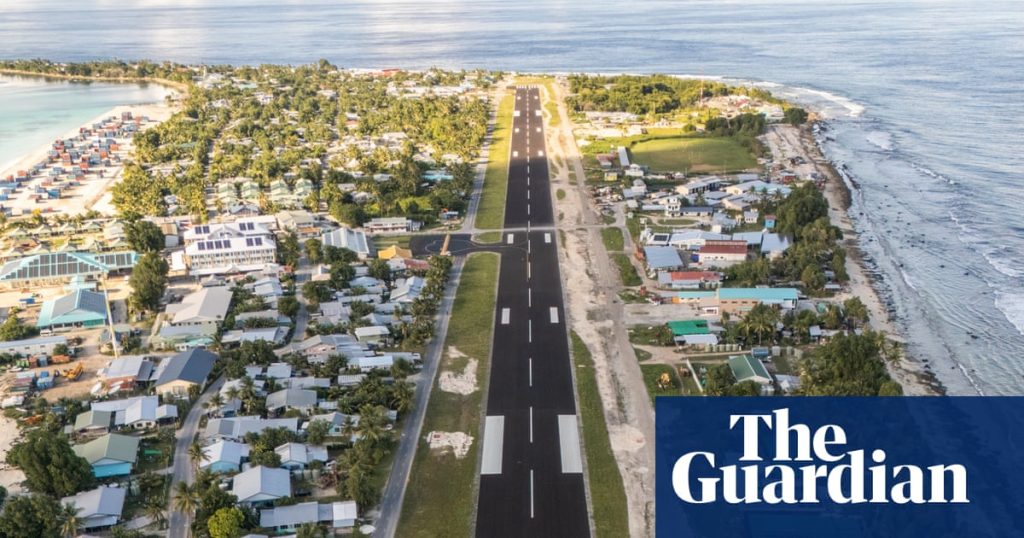Climate and migration experts are calling for urgent action to create legal pathways for people displaced by the climate crisis, as a new report highlights the scale of the problem across the Pacific.
Research by Amnesty International released on Thursday found current immigration systems are inadequate for Pacific Islanders seeking safety and stability, as rising seas threaten to make their homelands uninhabitable.
Amnesty has called on New Zealand – home to the world’s largest Pacific diaspora – to urgently reform its policies to provide “rights-based approach to climate-related displacement”.
“This would include offering a dedicated humanitarian visa,” the report said.
It also argued providing safe options for those most severely affected by climate change through humanitarian visas is “part of states’ obligations to ensure protection for people whose human rights are being threatened”.
The report highlights how Tuvalu and Kiribati, where most land lies just 2 to 3 metres above sea level, face existential threats from rising seas, coastal erosion, and extreme weather. These impacts already undermine access to clean water, food, and safe housing.
According to the World Meteorological Organization (WMO), at least 50,000 Pacific Islanders each year face the risk of displacement from climate impacts such as sea level rise and extreme weather. More than half of the Pacific Islands’ population live within 500 metres of the coast, the WMO said, where sea levels are rising faster than the global average and driving pressures for climate-induced migration.
There are some schemes for Pacific migration – namely to New Zealand and Australia – that provide pathways and could be used by those affected by the climate crisis. But experts say current pathways are inadequate and exclude some groups.
“Pacific people are already on the move not as victims, but as skilled workers seeking stability and opportunity,” Tupai Fotu Jackson, a Pacific climate and labour mobility expert from New Zealand, said.
“We need a humanitarian visa pathway that recognises climate displacement not as a crisis of desperation, but as a reality that demands planning, dignity, and partnership.”
Dr Satyendra Prasad, the former Fiji ambassador to the UN and senior fellow in climate and sustainability at the Carnegie Endowment for International Peace, said New Zealand should create a “pathway to full residency for Pacific Islanders” working under labour migration schemes.
Prasad said he hoped the report would “ignite energy and action within New Zealand to create a visa category for Pacific Islanders facing displacement as a consequence of climate change”.
Any migration pathway should complement, not replace, urgent climate action and support for in-place adaptation, the report said.
About 320,000 people in the Pacific were displaced by disasters between 2008 and 2017, according to the International Organisation for Migration. Nasa projects sea levels could rise by up to 15cm over the next 30 years.
“Experiencing and seeing what is happening in the islands, if there was some sort of ‘refugee visas’ for us, I would definitely go for that visa,” said Tealofi, a 47-year-old Tuvaluan man quoted in the report.
“You experience and see the bad impacts we see from climate change, especially in those days when you see the impacts of king tides and all the damages it provokes, why would I not want to apply for international protection?” he said.
New Zealand’s immigration minister, Erica Stanford, would not comment on whether New Zealand would consider establishing a humanitarian visa because she had not yet seen Amnesty’s report.
Nearly 9% of New Zealand’s population identify with a Pacific background, the report said. Most are Samoan, followed by Tongan and Cook Islands Māori.
In 2017, the then New Zealand prime minister, Jacinda Ardern, proposed a humanitarian visa for 100 Pacific Islanders annually displaced by climate breakdown. The plan never eventuated, leaving advocates frustrated by the lack of progress.
New Zealand’s Pacific Access Category, which uses a lottery system and strict health requirements, excludes older people, those with disabilities, and others most vulnerable to climate impacts. Between 2010 and 2024, at least 26 applications were declined due to health-related requirements, forcing families to leave behind members with disabilities.
Tuvalu’s recent agreement with Australia, the Falepili Union treaty, offers a rare example of a legally binding framework addressing statehood and mobility in the face of rising seas. Tuvalu’s prime minister, Feleti Teo, told the Guardian in June “Australia is now the first country to legally recognise the continuity of our statehood despite climate change and sea level rise”.
He said while these principles have gained traction through Pacific and UN declarations, “the ultimate objective is to develop a treaty under international law that enshrines these principles.”

